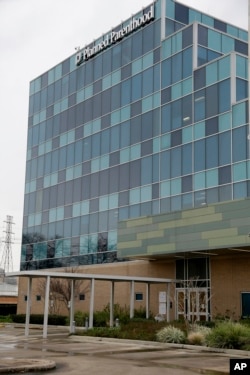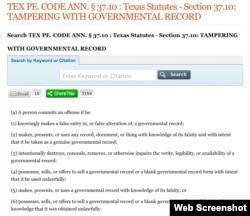Abortion rights proponents are cheering and abortion foes are fuming over a grand jury’s decision in Houston on Monday to indict two videographers who conducted a covert investigation of a Planned Parenthood clinic that was meant to show such clinics sell body parts from aborted fetuses.
The grand jury began its work two months ago after calls for an investigation of Planned Parenthood’s Houston clinic, which the video producers claimed was illegally selling fetal tissue for profit.
But the grand jury found no fault with Planned Parenthood and instead brought indictments against the two people who did the surreptitious video recording, David Dalieden and Sandra Merritt.
Each was charged with a felony for tampering with a government record — in this case, allegedly using fake California driver's licenses. The grand jury also indicted Dalieden for the solicitation or sale of human organs, a misdemeanor. Grand juries rarely indict people on misdemeanor charges, and the felony charge is based on a relatively obscure statute of the Texas Penal Code.
Dalieden, who heads the California-based nonprofit Center for Medical Progress, said he and Merritt used well-established investigative journalism techniques and should be shielded by the First Amendment, which protects freedom of speech and press.
But in a VOA interview, legal expert Melissa Hamilton, a visiting scholar at the University of Houston, said prosecutors were likely to reject that argument.
“If you are purporting to use a driver’s license, which is a public record, that is beyond the pale, because there are reasons for society to want to protect the legitimacy of purported government records,” she said.
Indictment reactions
Planned Parenthood spokesman Eric Ferrero hailed the indictments, accusing the videographers of having an “extreme anti-abortion political agenda.”
“As the dust settles,” he said, “and the truth comes out, it’s become totally clear that the only people who engaged in wrongdoing are the criminals behind this fraud, and we’re glad they’re being held accountable.”
Conservative religious leaders and politicians, however, condemned what they described as the unfair indictment of the anti-abortion video makers. A statement from the Texas Right to Life organization said, “When a grand jury indicts the very people who report a crime, rather than indicting the criminals, something goes clearly wrong.”
Texas Governor Gregg Abbott said the Houston grand jury decision would have no effect on a state investigation into Planned Parenthood’s practices, which he described as ongoing.
Hamilton said the law used to indict the two anti-abortion activists is rarely used, but she said prosecutors most likely would go forward with the case, which she said would continue to draw news media attention.
She said, “In the public eye, this case will continue to remain an issue, not because of these particular odd charges, but because the underlying issue is abortion rights.”
Divisive issue
The political divide between anti-abortion groups and reproductive rights groups has existed for many years. A woman’s right to an abortion was affirmed in the landmark Supreme Court case Roe v. Wade in 1973, but debates about what states can do to regulate and control abortion have continued.
In 1992, the Supreme Court ruled that states could not put undue restrictions on abortion clinics to effectively curtail their operations. But some states have continued to use regulations to limit the availability of abortion facilities.
Texas, for example, drew nationwide attention in 2013 with a law that requires abortion clinics to meet standards that would result in the closing of all but 10 abortion facilities in the second most populated state in the country.
The Supreme Court has blocked implementation of some parts of that law and is scheduled to rule on a challenge to the law in June, just before the two major political parties hold their national conventions and the last phase of the presidential election season begins.
The abortion issue entered the presidential campaign debates last July when the videos shot in Houston and at other clinics around the country were first shown.
Republican candidates condemned what they saw as horrible practices carried out at abortion clinics and the alleged illegal sale of fetal organs and tissue, while Democrats attacked the videos for using graphic images to incite audiences and for editing tricks that provided a fraudulent view of Planned Parenthood’s practices.
Abortion has not dominated recent debates, but that could change, depending partly on the Supreme Court decision in June, and on news generated by the indictments in Houston; lawsuits filed against the video producers by Planned Parenthood in San Francisco; and results from the ongoing abortion clinic investigations in Texas and other states.






